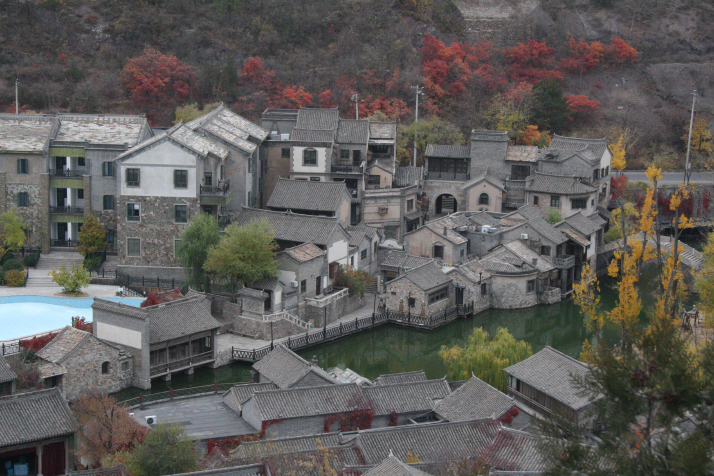
Last fall, I spent a couple of days in Gubei Water Town, two hours away from downtown Beijing in the city's northeastern suburbs. Located in the mountains, adjacent to the Simatai section of the Great Wall, the town is a reproduction of the typical water towns found in the southern parts of China.
Walking around the town is a pleasure from the moment you walk through the main entrance. Gazing at scenes of the canals, leisure boating and the small bridges characteristic of such towns, you'll pass by well-designed closed-knit agglomerations of houses on each side of the narrow brick walkways and streets. Everywhere you turn your head is a picture-perfect setting for your photo collection. Make sure your cellphone has plenty of megabytes remaining.
The Gubei Water Town was originally a project created by the efforts of three small villages. There are Peking Opera performances and water fountain shows as well as restaurants galore and, most recently, several coffee shops. You can take one of the numerous small buses, which run 24 hours a day, to go anywhere in the town, and you can also walk to the Simatai section of the Great Wall. Later, you can relax in one of the natural hot spring pools available at different locations in the town. One coffee shop in particular, at the top of a smaller mountain, becomes quite crowded just after sunset as, from its terrace, you can take the perfect picture of the whole town with all its lights on. Day and night, this (weekend) getaway has the magic setting to allow you to put aside your daily routine and enter into another realm for whatever length of time you can.
Small towns and villages all around China have become vacation spots in recent years thanks to the Chinese Government's poverty alleviation projects. People in many mountain villages, often almost inaccessible, were having a hard time sustaining their traditional lifestyles. Through poverty alleviation projects, the government sent not only officials but also experts in different fields such as agriculture, business and tourism to these remote areas to evaluate what possible income-earning undertakings would work in each environment. Some, for example, discovered that the mountain environment was ideal for growing certain medicinal plants while others exploited a special talent or product produced in the village and, with the help of government funding to build roads and make the villages accessible, were able to reach out to the rest of China and beyond with their products.
Many of these villages were located in beautiful mountain settings and were therefore earmarked for tourism development. These villages underwent renovations and built facilities to accommodate vacationers, which create work and business opportunities for locals. People are now flocking to these remote places for short or long stays. With China's efforts at building up the infrastructure of previously difficult-to-reach areas through roads and highways, high-speed train lines and housing projects, these places are slowly becoming more economically stable and self-sustaining for the survival and wellbeing of the local people.
We can expect to see more development in the tourism industry as the Chinese people have shown their love of leisure travel. Websites are hosting more articles, travel blogs and vlogs talking about points of interest throughout the country. We are also seeing an upward trend in the sale of recreational vehicles and the establishment of camping sites with full facilities for these vehicles.
So, go and discover your favorite mountain village and take a break for a few days. After all, what could be a better rejuvenating experience than a relaxing escape in a mountain bed and breakfast? Go ahead, have your weekend inside a postcard!
The author is a Canadian living in Beijing
Copyedited by G.P. Wilson
Comments to dingying@cicgamericas.com